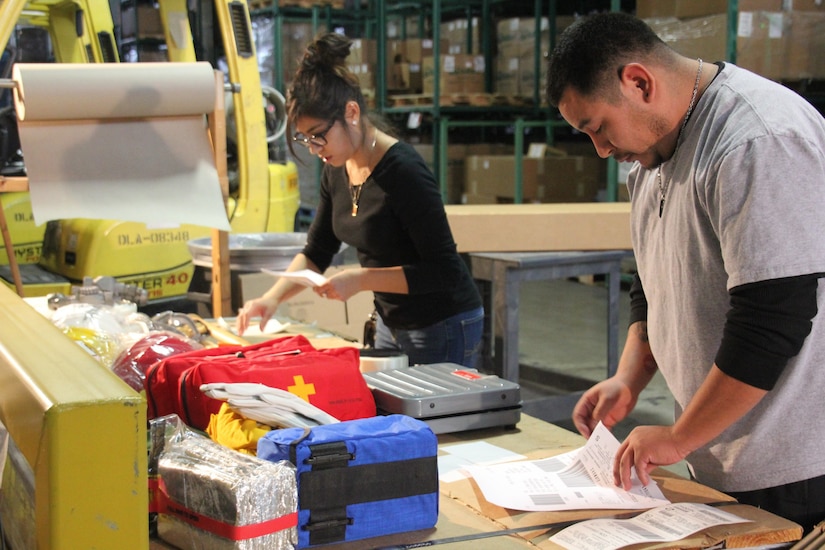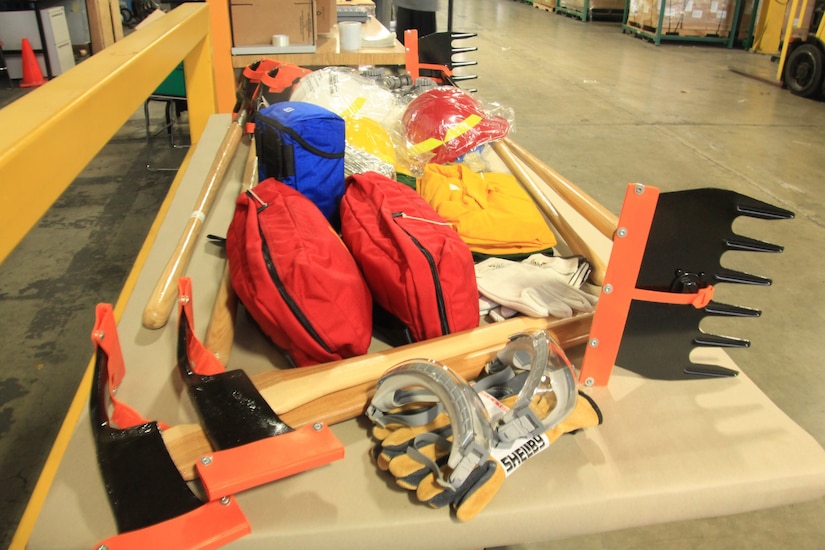Feb. 11, 2021 | , Defense Logistics Agency
Day, night, weekend or holiday, Defense Logistics Agency customers are only about seven seconds away from speaking to a representative who can answer supply questions that range from an order's delivery status to equipment availability. No voice-activated responses. No frustrating prompts or holds.
''The Customer Interaction Center is one of DLA's hidden gems. A lot of what the team does goes unnoticed because they do it so well. Supporting customers is their priority, and they take it seriously,'' said Andy Monday, director of DLA Logistics Operation's Customer Support Division.
Open 24/7 and located in Battle Creek, Michigan, the CIC is DLA's ''one-call resolution center.'' The staff receives 1,200 to 1,600 customer contacts a day via phone at 1-877-DLA-CALL or online queries; Monday said the team's quest to answer all calls in under 30 seconds is well above industry standards.

In 2020, agents processed 463,878 actions with an average handling time of 12 minutes, 19 seconds. About 75% of those actions were done by CIC agents at the lowest level, said Shannon Calhoun, deputy director of customer support.
''That's a pretty large percentage of calls that we were able to resolve quickly and didn't have to escalate for what we call level-two research by DLA employees at the major subordinate commands,'' she said.
The rest of the contacts involved more complex matters, including contractual issues and backlogs. In each case, a response describing how those service tickets were being processed was sent to customers within 24 hours.
Steady Pace
Though military operations decreased some in 2020 due to the pandemic, Calhoun said the number of contacts agents handled remained similar to those of previous years due to an intense wildfire season and the need of troops for personal protective equipment.
''There are always ebbs and flows, but our work stayed steady with DLA providing COVID-related supplies to all the services. We also supported all the wildfires in California and beyond,'' Calhoun said.
Firefighters typically place emergency orders via email and follow up with a phone call to CIC agents, who alert DLA Distribution San Joaquin in Tracy, California, with the order number, line items and quantity requested before finalizing the order in DLA's Distribution Standard System. Agents completed 1,466 emergency orders worth over $47.2 million during the 2020 fire season compared to $10.8 million in 2019.
On the weekend of Aug. 21, CIC agents processed four emergency orders for 105 items. One order called for 7,000 radio batteries, said Megan Krueger-Youmans, a CIC customer support specialist, in an August interview.
''Every time the firefighters go out into the field and come back, they replace their batteries even if they only used them for an hour because they don't want to go back out and not have communication,'' she said. Equipment was further strained by firefighters inability' to share personal protective equipment, such as helmets, due to COVID-19.

Data-Driven Results
Data the agents collect during customer contacts is compiled by the CIC Customer Analytics Team to provide an overview of interactions specific to geographic location; for military customers, the information is sorted into categories, such as installation, unit and service branch. Data reports are shared with senior leaders to inform them of local interactions with DLA before they visit customer locations. A Customer Analytics Report and Engagement Summary is also shared monthly with customer support representatives co-located with military units, as well as DLA liaison officers for geographic combatant commands or federal agencies and military national account managers at DLA Headquarters.
''These reports give our forward-facing DLA employees a complete breakdown of who's calling the CIC the most and what their top issues are,'' said Jim Croyle, analyst team lead.
A January summary capturing CIC interactions with Navy customers, for example, lists 10 units with the most tickets initiated in December. Reasons for contact are broken out, as well as the National Stock Numbers most frequently involved.
''This helps them identify their customers' pain points and areas where customers may need some additional help,'' Coyle added.
Customers repeatedly calling to ask ''Where's my stuff?'' can signal the need for formal, hands-on FedMall training, Calhoun said. And DLA trainers frequently use the data to customize instruction for specific audiences by including examples from the calls to teach customers how to navigate online tools with document numbers they're familiar with.
''On top of the formal training, when agents find answers from a tool customers have access to, they'll take the time to train the customer right there on that call to find the information themselves,'' said CIC Chief Penny Young.
Teaching customers to be self-sufficient frees agents' time so they're available to help with more complex issues, Monday added.
New agents get five to six weeks of training that familiarizes them with DLA's business portfolio, requisition types and automated systems for placing and tracking orders. Each has immediate access to systems that help them answer customers' questions, and information technology modernization now in progress is expected to increase agents' capability for communicating with customers.
''Our current modernization efforts will bring us into the current age so we're able to use things like online chats that we already have access to in our personal lives,'' Calhoun said. ''Our new service tool will also have more of a portal feel that allows customers to ask simple questions on the web.''
The goal is to simplify the customer and agent experience using new technology, not eliminate agents. Instead, they can work through more involved issues.
''Without the CIC, our ever-shrinking, customer-facing force would be inundated with all these phone calls and questions that our agents are trained and available to address. Our customer support representatives and LNOs are there to provide more in-depth assistance as customers plan for future operations or look for creative solutions rather than help them solve simpler issues,'' Monday said.
The CIC is a consolidation of what was once several help centers with different phone numbers operated by each of DLA's supply chains. It became a 24/7 operation the day of the 9/11 terrorist attacks.








No comments:
Post a Comment